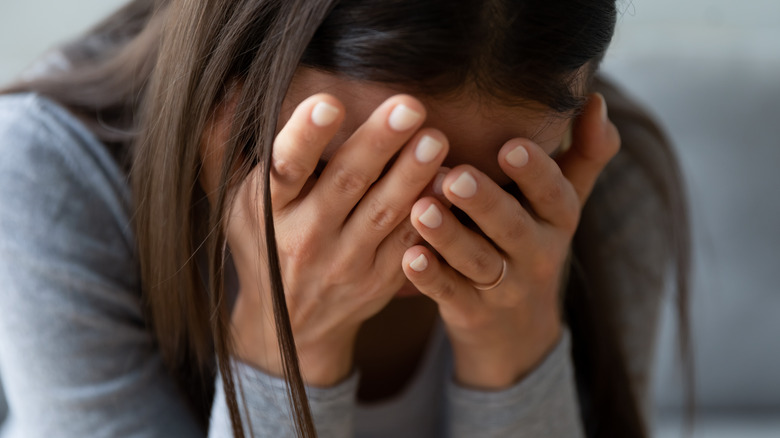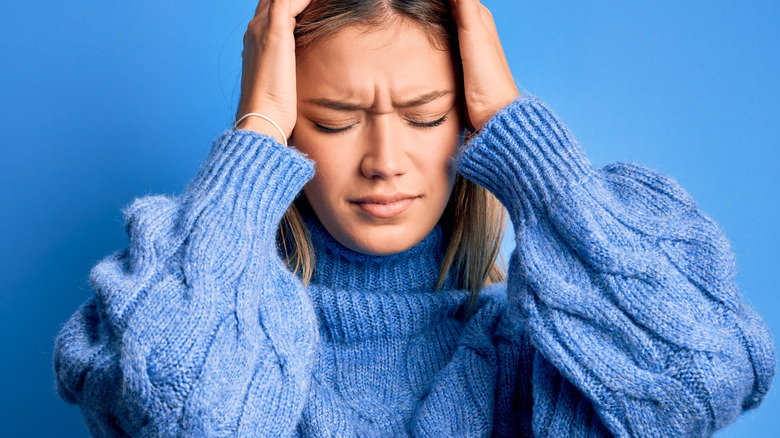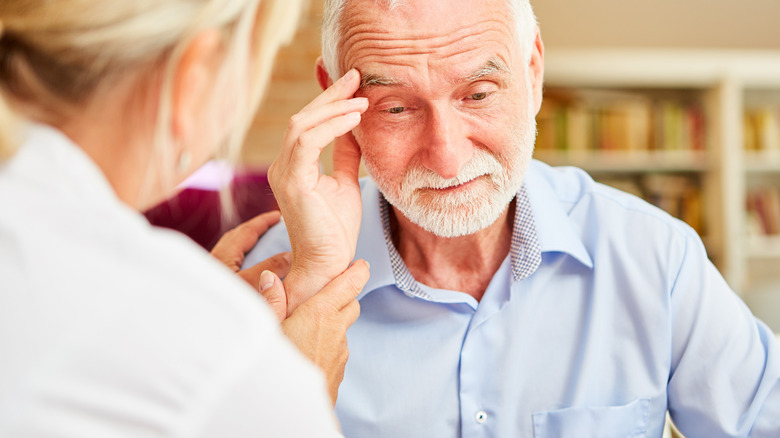What Happens To Your Body When You Have A Mental Health Crisis?
A mental health crisis isn't a medical diagnosis, and it doesn't refer to just one particular kind of mental illness or fixed set of symptoms (via PsychCentral). Rather, it's a general phrase used to refer to an abnormal response to stress or a particularly stressful situation that causes one to lose the ability to function normally in their daily life. A mental health crisis may or may not be connected to an underlying mental disorder such as anxiety and depression.
The effects of this loss of control on your body and mind can be widespread — from feeling tired all the time to having digestion problems — and it can seriously impact your ability to work and take care of yourself and your family (via the Cleveland Clinic). The severity of a mental health crisis can vary from person to person, and may or may not resolve on its own. Treatment consists of rest, practicing relaxation techniques, and therapy. If you are having thoughts of self-harm, it is crucial to seek professional help immediately.
If you or someone you know needs help with mental health, please contact the Crisis Text Line by texting HOME to 741741, call the National Alliance on Mental Illness helpline at 1-800-950-NAMI (6264), or visit the National Institute of Mental Health website.
What can cause a mental health crisis?
Mental health crises can be triggered by a variety of things. They may be caused by a worsening mental health condition, such as anxiety or depression, that has gone untreated (via Houston Behavioral Healthcare Hospital).
Major life changes, such as getting married or divorced, having a baby, moving to a new location, or going to college, can all cause adequate stress to trigger a mental health crisis. Work stress, or burnout, is another common trigger, as is feeling overwhelmed by stress at home. A traumatic experience can result in a mental health crisis, too. Some common examples include losing a loved one, having a serious car accident or suffering abuse.
Lifestyle factors such as not getting enough sleep, can precipitate or worsen a mental health crisis, as can excessive drug and/or alcohol use (via Healthgrades). Lastly, your risk of a mental health crisis increases if you have a family history of anxiety disorders, inadequate social support, or financial hardship.
You're unable to function normally
Everyone experiences periods where they feel less than their best, and getting through the day is challenging. However, when you are having a mental health crisis, each day is a struggle, and the demands of life simply become overwhelming (via the Mayo Clinic).
You may not be able to get out of bed, go to work, pay your bills, or take care of your children. A build-up of responsibilities and not meeting the demands of your daily life can exacerbate your condition. Your personal hygiene may suffer to the extent that you don't shower, brush your teeth, or keep your clothes clean (via HealthDirect). You may also fail to get proper nutrition.
Isolating yourself and neglecting your social responsibilities to your friends and family in a way that's abnormal for you is also common, and this negatively affects your relationships. In general, any activities that you used to carry out without problem can become problematic and a bit too much to bear when you are experiencing a mental health crisis.
You feel depressed
Depression is a common symptom of a mental health crisis. Depression isn't normal sadness in reaction to a sad event that dissipates after a normal amount of time; rather, it is a pervasive feeling of hopelessness, sadness, and low mood, and a loss of interest and pleasure in the things that you use to enjoy (via American Psychiatric Association).
If you are depressed, you may feel a sense of guilt or worthlessness, and have trouble focusing, thinking, or deciding on things. Your self-esteem may take a hit, causing you to feel abnormally down about yourself and your abilities (via MedicalNewsToday). You may find yourself increasingly engaging in purposeless physical activity such as handwringing and pacing, or you may find your physical movements and speech are slowed.
Other symptoms of depression include lack of energy and extreme fatigue, making you feel like even normal tasks are too physically demanding. You may lose your appetite and subsequently lose weight — or you may have cravings for certain unhealthy foods, which can cause you to gain weight. Depression can also result in physical aches and pains that occur throughout your body and for no reason. At the extreme, you may have thoughts of death and harming yourself.
You feel anxious
Anxiety is a mental health disorder that can manifest in general anxiety, post-traumatic stress, or phobias. However, it can also be a symptom of a mental health crisis that occurs along with other symptoms.
Although everyone experiences anxiety at times due to stress — for example, before a big work presentation or school exam — the anxiety associated with an anxiety disorder or a mental health crisis is typically amplified and longer-lasting (via the National Institute of Mental Health (NIMH)). Anxiety can make you feel fearful and uneasy, and fill you with a sense of dread (via MedlinePlus). You may feel restless, unable to relax, and have invasive thoughts that you can't control.
Anxiety also causes physical symptoms, such as a racing or irregular heartbeat, sweating, muscle aches and pains, dizziness, and shortness of breath. As with depression, anxiety can cause you to lose interest in events or activities you used to enjoy, or to avoid daily activities you used to do.
You have panic attacks
Mental health crises and panic attacks are two separate mental health conditions; however, you may experience panic attacks as part of a mental health crisis (via Bridges to Recovery).
Panic attacks are a specific type of anxiety-related phenomenon that is acute, meaning it comes on suddenly. Symptoms can be both physical and psychological. Physical symptoms may include chest pains, headache, rapid heartbeat, sweating, tremors, abdominal pain, nausea, hot flashes and/or chills, tingling or numbness in the hands or feet, and shortness of breath. Meanwhile, psychological symptoms often include intense fear and a sense of imminent danger or doom, a fear of dying or losing control, and feeling detached either from reality, from yourself, or both (via National Alliance on Mental Health).
Panic attacks are typically short in duration — around several minutes or so, according to MedlinePlus. After they pass, people often feel even more stressed and fatigued than before (via Bridges to Recovery). Although you may have a single panic attack, they are likely to occur repeatedly over time (via MedlinePlus).
You experience post-traumatic stress disorder symptoms
Post-traumatic stress disorder (PTSD) is another type of anxiety disorder that can exist on its own and also be part of a mental health crisis. PTSD is typically a reaction to a shocking, terrifying, or high-risk traumatic event (via the National Institute of Mental Health).
Although everyone experiences fear and stress in the face of such an event, PTSD manifests in recurring feelings of stress and fear even long after the traumatic event has passed. Symptoms of PTSD include flashbacks, nightmares, and intrusive, uncontrollable thoughts about the event; feelings of guilt and shame related to the trauma; reckless and self-destructive behaviors; severe mood swings; avoiding places or situations that remind you of the trauma; hallucinations involving seeing or hearing things not based in reality; and feeling paranoid, as if someone is watching or following you (via Healthline). Other symptoms may include being easily startled and feeling tense or on edge; angry outbursts; problems sleeping, negative thoughts about yourself and/or the world, and loss of interest in activities you normally enjoy (via NIMH).
You can't sleep
Having trouble sleeping is a common effect of stress, anxiety, depression, and all the other signs and symptoms of a mental health crisis. Even though you may feel very fatigued, it's not unusual to either have trouble dozing off or staying asleep when you are experiencing a mental health crisis. It may take you hours to successfully fall asleep, or you may find yourself waking up frequently and potentially not being able to fall back asleep.
According to the Sleep Foundation, stress causes your body to produce increased amounts of the stress hormone cortisol, which is also known as the "fight or flight" hormone. Research has shown that abnormal cortisol production can cause fragmented sleep, reduced deep sleep, and reduced total sleep time. Unfortunately, insufficient sleep can cause or exacerbate mental health crises, because lack of sleep is associated with increased levels of cortisol, according to Psychology Today.
Your appetite changes
The combination of stress, anxiety, depression, and sleep deprivation that are part of a mental health crisis can have varying effects on your appetite.
People react differently to stress, as do their appetites. According to the Cleveland Clinic, some people will disregard their typical hunger cues when stressed and neglect to eat. This usually happens when the person is so focused on their stress that they don't notice their hunger. On the opposite end of the spectrum, some people self-medicate with food, overeating to try make themselves feel better or distract them from their feelings. Increases in cortisol in your body during periods of stress can also lead to cravings for unhealthy foods, such as those high in sugar, salt, and fat. This may be due to your brain thinking that it needs excess fuel to fight whatever impending danger it may be facing, whether real or imagined. Weight loss and weight gain can also contribute to stress and anxiety, further exacerbating your symptoms (via Calm Clinic and GoodRx Health).
Your digestion is poor
The effects of stress on the digestive system are well documented. The enteric nervous system helps regulate digestion, and it interacts with the sympathetic system that triggers the body's "fight or flight" stress response (via Harvard Health Publishing).
Under increased stress, digestion slows — or even comes to a halt — so the body can direct all its energy towards defending itself towards a perceived threat. When this happens, contractions of digestive muscles slow, and the body decreases production of the secretions that are necessary for healthy digestion to occur (via Brigham Young University). This can result in stomach pain, bloating, and constipation or diarrhea (via NHS).
Stress can also cause acid reflux, excess stomach acid, gas, heartburn, cramps, and nausea. Although the body is able to recover from infrequent digestion interruptions due to stress, long-terms stress can lead to the development of stomach ulcers and irritable bowel syndrome. It can also play a role in Crohn's disease, gastritis, gastroesophageal reflux disease (GERD), and infections.
When to contact your doctor
A moderate amount of stress in today's demanding world is to be expected, but if you are feeling out of control and in crisis, you should seek professional help. But because a mental health crisis isn't a diagnosable condition, and signs and symptoms can vary widely, it can be hard to know when to get help.
Mental Health America recommends contacting a healthcare professional when you are experiencing the following symptoms: confused thinking; prolonged, depression, sadness, and/or irritability; feeling extreme highs or lows; excessive fear, worry, and anxiety; social withdrawal; unusual changes in appetite and sleep habits; intense feelings of anger; hallucinations or delusions; unexplained physical ailments; reduced ability to cope with daily problems; reduced ability to handle daily responsibilities; and problems concerning substance use.
If you or someone you know is struggling or in crisis, help is available. Call or text 988 or chat 988lifeline.org
Treating a mental health crisis
There is no single treatment path for a mental health crisis. The goal of treatment is to get to the root of what is causing your symptoms, address any underlying physical or mental health conditions that may be contributing, and to treat individual symptoms. You can contact your primary care doctor who may then refer you to a specialist, such as a therapist or psychologist.
Treatment typically includes some type of therapy. Cognitive behavioral therapy is a common method which can help you manage stress and anxiety by helping you shift your thoughts, feelings, and behaviors (via the Cleveland Clinic). Group therapy can also be helpful to learn about how others have successfully bounced back from a similar predicament (via Bridges to Recovery). Your healthcare professional may also prescribe medication to treat depression or anxiety.
Lifestyle changes to manage stress may include seeking out new employment, leaving a stressful relationship, or reducing your responsibilities. Learning how to practice relaxation techniques, meditation, and mindfulness exercises can also help treat a mental health crisis.
Preventing relapse
Even after you've recovered from a mental health crisis, it's important to continue to practice healthy habits to prevent a relapse (via the Cleveland Clinic).
Take care of your physical health by eating a nutritious diet, getting adequate sleep, and exercising regularly. Avoid recreational drugs and alcohol and excess caffeine from coffee, tea, chocolate, and cola, as these substances can place additional stress on your body. Learn relaxation strategies that can help you cope in stressful situations. Regular meditation, breathing exercise, mindfulness, yoga, and progressive muscle relaxation are some strategies to try.
Other ways to relax include getting a massage, spending time in nature, listen to relaxing music, laughing, and spending time with your pet (via the American Institute of Stress). Get organized and make sure you build in plenty of time for rest breaks. Scale back your to-do list and set your priorities to focus on what's most important. Continue to take your medication if your doctor advises it, and stay in therapy for as long as you need if it is helpful (via Here to Help).
Helping a loved one through a mental health crisis
Watching a loved one suffer can make you feel helpless. The most important thing you can do is listen and try to empathize with what they are feeling (via the Cleveland Clinic).
If they are overwhelmed, validate their feelings (via Mental Health America). Instead of offering advice, ask what they need and how you can help them. Create a safe and relaxing environment, and gently encourage them to seek professional help. If they are open, help them make the lifestyle changes that will enable them to cope with stress in a healthier way. Encourage them to practice self-care and relaxation strategies such as yoga and meditation.
Never force your help on anyone, as that can cause people to withdrawal further. However, if you are concerned that your loved one is in danger, it may be necessary to intervene. Also, remember that maintaining your own mental health is crucial to helping another. Practice self-care and find your own support system that can help you through the stress of caring for someone with mental health problems.














